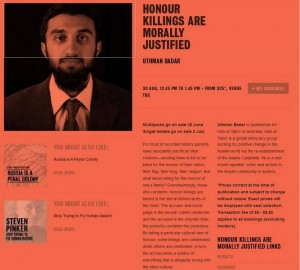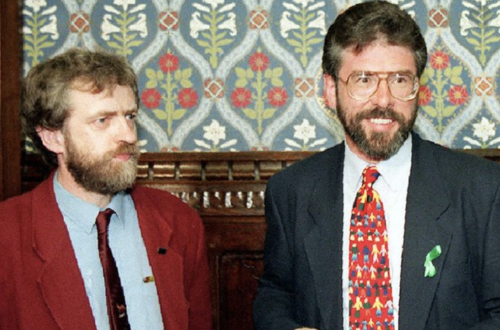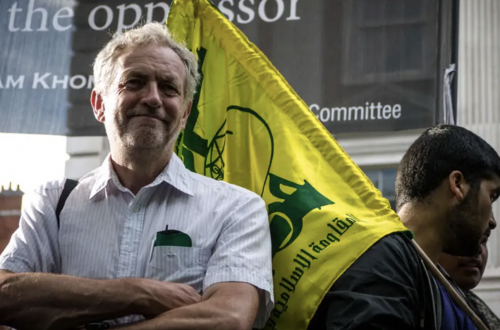What constitutes anti-Muslim prejudice? Saif Rahman tried to answer this question in a thoughtful piece, ‘When does criticism of Islam become Islamophobia?’ These are some key points – but do read the full post here.
I’ll begin by explaining why I have a problem with the term ‘Islamophobia’.
Islamophobia is a neologism – a recent word invented to protect the ideology and its adherents from criticism, a kind of social blasphemy law. The word itself is an etymological fallacy, dictionary definitions define phobias are an ‘unnatural fear of someone or something’ so beliefs and ideas do not even come within its scope.
It is also unhelpful, because if left unchecked it;
- blurs acceptable boundaries and culls debate
- treats all criticism of Islam with equal disdain
- equates Islamophobia with racism
- gives a free ride to exponents of Islamism, magnifying their voices whilst countering narratives are hushed
- inhibits free speech which often acts as a catalyst for positive change.
…
All ideas and beliefs should be open to question and criticism. Exceptionalism, or singling out anything in particular with protectionist kid-gloves is not only condescending, but arguably a form of reverse-racism which only serves to alienate such groups even further.
…
It’s true anti-Muslim sentiment exists, and clear boundaries need to be drawn. Only last week the trial began of the Midland’s mosque nail bomber, a white supremacist who also murdered a defenceless 80yr old Muslim by plunging a knife in his back. Unchecked we could continue to ferment hatred between different parts of the world and at one end of the extreme, genocide or another holocaust could result – something which many commentators on both sides of the fence feel is already happening.
So when does criticism of Islam become Islamaphobia? When the criticism prejudices and stigmatises Muslims rather than their beliefs.
There’s a fair bit of overlap between Saif’s argument and the points made by Tell MAMA, with some understandable exasperation, in their own recent post, ‘A clarification on our work on anti-Muslim prejudice’.
We have made clear before that our role is not to ‘protect religion’ but to support victims of anti-Muslim prejudice and to work with police forces to ensure that prosecutions are secured where possible. Our work also involves mapping, measuring and monitoring anti-Muslim hatred. This means that those who are critical of religion, whether it is Judaism, Christianity, Hinduism, Islam or any other belief system are not the focus of our work unless, for example, contextually they target Muslims and in doing so also use Islam as a cover for marginalising and caricaturing Muslims. Context, past form and evidence are essential in assessing whether cases will form part of the final statistical figures which are then independently analysed by Teesside University. These are all published annually and we are in the process of releasing our 2013/2014 annual report in the next few weeks.
Similarly, criticising or ridiculing an individual, for their political and social views, who also happens to be a Muslim, does not automatically constitute anti-Muslim prejudice. To suggest it does is to place Muslims and Islam beyond the reach of everyday discussion and debate. Nothing fuels the far-right more than the notion that Muslims are seeking a special privileged status for themselves and their religion. It is, therefore, vitally important that Muslims don’t inadvertently give fodder to the far-right by using our organisation to pursue personal vendettas against individuals whom they have had disagreements with.
Of course there are grey areas, and people may be sincere, free of bigotry or any sinister agenda, and still not be in full agreement over what constitutes anti-Muslim sentiment. But one recent accusation of Islamophobia struck me as particularly egregious – this charge was levelled at those expressing outrage at publicity for a talk titled ‘Honour killings are morally justified’.
Uthman Badar, of Hizb-ut-Tahrir, had been scheduled to speak at the Australian Festival of Dangerous Ideas, but has now been pulled from the programme following protests. Badar has asserted that the outcry reveals ‘deep Islamophobia’, and this complaint is echoed by Yassir Morsi. His argument, given the title of the proposed talk, is disingenuous.
However, Badar did prove something. Without uttering a single word in defence of “honour” killings – not that he was ever planning to – Badar had his face plastered all over the nation’s imagination as a bigot, misogynist, and an extremist Muslim. The speed and scale of the condemnation is itself frightening, and telling, as is its persistence.
There’s a frustrating blend of suggestive analysis and really problematic assertions in Morsi’ final paragraphs:
The lesson again is that Islamophobia is not something we should reduce to a negative way of describing Muslims. It is not simply a concern about, or a criticism of, Islam. It is not simply fear or hostility. It is not even simply a closed-minded bias, a double standard or bigotry. Most importantly, it is not, as is so commonly misunderstood, about making generalisations; as if, in the last instance, an Islamophobe can simply free themselves of the charge of defaming a Muslim by simply disclaiming they are not talking about allMuslims.
Islamophobia is better understood as a sort of unchecked energy that drives a frenzy of media scrutiny. It is marked by rituals, a sense of a story, an element of sensationalism, loaded language, to explain what is wrong with those Muslims who aren’t integrated. It is a set of questions, and a conversation with shallow answers about what it means to be us by talking about them; a ritual to purify the social space that is premised on a suspicion about the danger of those on society’s edges, on fringes defiling us; a danger that manifests itself into the face of a red-tinted Badar who is told to get out. Islamophobia is the exploiting of the Muslim for one’s own fantasies. In that sense Badar was both its victim and its unwitting accomplice.
Beginning with the final paragraph – I think there is something in this, in the idea that the debate is too often driven by sensationalism and overstatement (see Mehrdad’s recent post). And just because Badar is a fair target for criticism doesn’t mean that some criticism of him may not fall into the category of crude Islamophobic abuse.
In the previous paragraph the words ‘not simply’ preface several different things, some of them reasonably clearly negative. But included in the list is ‘not simply a concern about, or a criticism of, Islam’. The rhetoric thus implies that any criticism of Islam, even any concern, is bigoted. When combined with the conclusion of the paragraph – that even critics who avoid generalisations may be on dodgy ground – it begins to look as though no criticism of Islam or even of Muslim groups or individuals is legitimate.
It’s completely reasonable and not at all Islamophobic* to protest against a talk with Badar’s title, just as it would be justified to protest against a talk promoting the death penalty for homosexuality, or suggesting it was time to rehabilitate Hitler. One could argue, from a libertarian perspective, that the talk should not have been cancelled, but that is a slightly separate issue.
As many have pointed out, Badar did not in fact intend to justify honour killings. The title, suggested by the organisers and agreed by him, was misleading. But even though it wouldn’t have been as shocking as the title implied, the abstract of the proposed talk still throws up plenty of problems. Here it is, via Butterflies and Wheels:
For most of recorded history parents have reluctantly sacrificed their children—sending them to kill or be killed for the honour of their nation, their flag, their king, their religion. But what about killing for the honour of one’s family? Overwhelmingly, those who condemn ‘honour killings’ are based in the liberal democracies of the West. The accuser and moral judge is the secular (white) westerner and the accused is the oriental other; the powerful condemn the powerless. By taking a particular cultural view of honour, some killings are condemned whilst others are celebrated. In turn, the act becomes a symbol of everything that is allegedly wrong with the other culture.
The analogy between the sacrifices made by young people in war and ‘honour killings’ is grossly distorted – to raise just one objection, the word ‘honour’ has a quite different meaning in the context of war, and most people probably don’t even see their choice or need to serve in the army as primarily a question of ‘honour’.
Ophelia Benson is suitably trenchant in her own response to Badar:
Notice, also, the pretentious pseudo-literary word-juggling, the “critical theory” airs and graces, the palaver about symbols and the epigram about condeming some and celebrating others – notice it and feel nausea at the cynical frivolity, the vanity, the having it both ways, the showing off. This isn’t some fucking game.
There’s another very important problem with his abstract. He claims that it is ‘overwhelmingly’ the ‘powerful’, the ‘white’, in the West who condemn honour killings. As well as softening and relativizing, while not condoning, honour killings, he brushes aside the fact that many women and men from the communities and countries most affected by such violence (including communities in the West) are campaigning against it. One reason why perhaps still more fail to do so, is because they are working within a more challenging context. It was very quick and easy to find examples – a Jordanian journalist breaking taboos to campaign against honour violence, the Iranian and Kurdish Women’s Rights Organisation, a statement from the MCB, a female judge in Pakistan speaking out and a (male) Palestinian hip hop group. Inadvertently, Badar is feeding prejudice by glossing over, not just the work done by more secular, feminist and dissident voices in MENA/South Asian countries and communities, but even the clear opposition to honour violence from more orthodox and conservative organisations (such as the MCB) who may equivocate on some issues but would absolutely not claim, to go back to the title of Badar’s talk, that ‘honour kiling is justified’.
Update – as KB Player points out in the comments, this is a really excellent piece by Joanne Payton.
*particularly in the light of an almost universal agreement, amongst Muslims, that such killings are unislamic.



